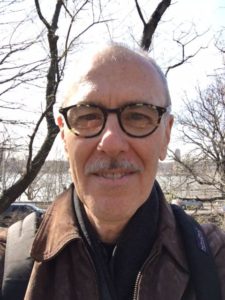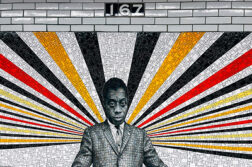In 2010, five years before the Obergefell decision, New York, my home state, had still not made same sex marriage legal, but was honoring out-of-state marriages. My partner and I talked about marrying, but actually, we were ambivalent about engaging in such a ritual. After all, wasn’t marriage really as much about ownership as it was about love, and who needs the state defining or legitimizing their relationship anyway?
Yet, we were moved by the marriages of our gay friends. We read about gay New Yorkers who traveled across the state line to marry in Greenwich, Connecticut. At least one of the wedding announcements in the New York Times included the name of the justice of the peace, so we called her. She was friendly, inviting and informative, explaining that we only needed to visit their town hall for a license, then she could marry us.
Randy and I talked about the wedding on and off for weeks. While we struggled with decisions of whom to invite and other typical quandaries of marrying couples, I feel that we never really got down to the underlying causes of our anxiety and ambivalence. In hindsight, I now believe that our (separate and shared) residual internalized homophobia was the real source of the problem. Essentially, I secretly wondered which friends and family would want to make the trip over the state line for a wedding of two men who had already been living together for a couple of years. Was it important enough, meaningful enough? Was the wedding authentic enough? These doubts were conveniently masked by the more mundane concerns.
Finally, on one exquisitely beautiful July morning, we decided to elope without informing anyone. We did not know what to expect at the town hall of this suburban village. After all, as young gay men in the 1970s we had both left the suburbs behind for life in the more accepting environment of New York City. Would they remind us of the world we escaped?
As it turned out, the women staffing the clerk’s office were remarkable. Upon hearing the reason for our visit, they congratulated us, all smiles and warmth. They guided us through the paperwork process, maintaining the pleasant, almost festive mood throughout.
When we arrived at the home of the justice of the peace with our license, she offered us her shady, green backyard as a setting for the ceremony. We were joined by her husband, who served as a witness and volunteered to photograph the wedding.
I started to cry as soon as we began. Sure, I was a little sad that our family and friends were not there. But what really moved me was the ceremony itself. I don’t remember our vows but they were, as the La Cage aux Folles lyrics go, “something about sharing; something about always.” I’m convinced that what moved me most was just that I was getting married to a man in my lifetime!
Many decades ago, as a proto-gay teenager, I would daydream about marrying someday. I had many crushes and was secretly in love with a close straight friend in high school. I imagined it would be wonderful to have him with me for life. But at 15, in the years before Stonewall, I knew this was only an impossible fantasy.
I recall some of my mother’s playful ridicule about this friendship. As teenagers do, my friend and I would spend most afternoons together after school, then talk on the phone in the evenings. Mom would tease, “Why don’t you two get MARRIED?!” Decades later I was in a long-term relationship with a man I loved and lived with, but when I visited my family I would take off his ring. One day, I forgot. No sooner was I in the door when she quipped, “What did you do, get MARRIED?!” Even though I was living as an openly gay man in another city, the contempt behind her teasing convinced me to remain closeted to my parents at that time.
Fortunately, I had a surrogate grandmother: my sixth grade teacher. We remained close and I came out to her decades later, worrying, needlessly it turned out, about the generational gap. She accepted me and Jim, my first partner, wholeheartedly. In fact, when we visited her in her home in Florida in the 1990s, when she was in her nineties, she insisted we take her double bed while she slept in the guest room. The last time I spoke to her before she died her memory was failing. She said to me, “Jimmy, I hope that you find a nice girl and get married.” I said, “But Ruth, I’m married to Jim. She guilelessly replied, “Oh, that’s right, I forgot.”
There are rules and laws setting standards and dictating what we can and can’t do But there are also subtle cues that have more ambiguous, but still powerful effects, on our choices. As I contemplate my actual wedding now, I was experiencing on that July day why the marriage ritual is so important. We humans are social animals. The impressions that we have on each other as we make our way through our days have impact, for good or for ill. Other people can dignify us or destroy us. When it comes to something as significant and practical yet as delicate and disposable as the choice to pledge to spend our lives with someone, the way the community treats our relationship can make all the difference. My experience with these friendly strangers, presumably heterosexual individuals who five or ten years earlier probably thought little about the lives and relationships of gay men, were completely on board. There they were, these generous people of good will, witnesses to our love and commitment.
That experience reinforced what I know: we humans make each other real. We become who we are through human interactions. We reflect and reinforce each other in ways that impact on our self-esteem and our shared realities. We often do this in indirect, seemingly mysterious, ways – in attitude, body language, tone of voice – using the empathy with which we are hardwired.To paraphrase our great, gay playwright, Tennessee Williams, “. . . the kindness of strangers” matters. Their kindness matters deeply.
 James Carnelia is a clinical psychologist who lives and works in Westchester County, New York. His specialties include psychoanalytic psychotherapy, hypnotherapy and working with people suffering from the effects of trauma.
James Carnelia is a clinical psychologist who lives and works in Westchester County, New York. His specialties include psychoanalytic psychotherapy, hypnotherapy and working with people suffering from the effects of trauma.







Discussion3 Comments
Bravo for this sensitive and moving essay. The author seems to let the reader know him and as a result, we see ourselves.
What a lovely and insightful article. Thank you for sharing your experience and allowing me to examine my own feelings and actions more mindfully.
Thank you so much for writing and sharing this lovely, complex reflection.